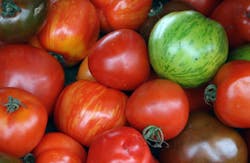Consumers across the globe are trying to switch to a more environmentally friendly lifestyle, and when buying products they often pick those that are made from natural and simple materials. However, color and appearance are factors that have always mattered and often dictate consumer decisions. Together, these forces are driving unparalleled demand for natural colorants that comply with the strict requirements of the modern processing industry, Food Processing says in a recent article.
The coloring industry is alsof influenced by food regulation changes. Demand for natural colorants in Europe, for instance, has been driven by the restrictions imposed on the use of artificial colorings for food, particularly red ones, which have been prompted by public outcry against FD&C Red 40. The limits have been set over concerns that one of the most commonly used food colors can increase behavioral issues and lead to hyperactivity in children.
Rajesh Cherian, laboratory manager at Roha USA Ltd., believes that colors have the power to change the way people perceive taste and palatability of a food or a drink. However, the trends in food colors are, as a rule, impacted by food flavors, individual preferences and regulatory requirements. Roha's marketing coordinator Tony Valenti said that despite the uptrend in natural color use, demand for their artificial equivalents is still solid, at least in the United States.
RELATED: Consumers willing to pay for longer shelf life
One of the questions that is yet to be answered when it comes to natural coloring is whether caramel color is really natural. "Natural" as a term still lacks legal definition and a number of food producers and natural product retailers use caramel colors to tint their "all-natural" products, according to Brian Sethness of Sethness Caramel Co.
Caramel color falls in the generally recognized as safe (GRAS) category and is thus exempted from the usual food additive tolerance requirements. Manufacturers and retailers make use of this fact and do nothing wrong when naming it "caramel color" or "caramel" on product labels. Besides, companies are not required to disclose its composition since it is a single-color additive.
Class I Caramel, or Plain Caramel, was recently found to be one of the fastest growing types of caramel colorants, which could be because Class I Caramel complies with demand for cleaner labels on food and beverage products.
In early 2012, the California Office of Environmental Health Hazard Assessment (OEHHA) started listing 4 Methylimidazole (4MeI) as a possible carcinogen in caramel color under Proposition 65 and required warning labels to be put on all products marketed in California that contain levels of 4-MeI above the "safe harbor" amount.
In order to meet the new requirements, a number of cola and baking firms started utilizing low-4MeI Caramel colors for their products. According to Sethness, whose company spent more than four years developing low-4MeI alternatives for its Class III and Class IV caramel colors, demand for low-4MeI caramel colors will keep on expanding.
With current technologies, color can now be derived from tomatoes, with shades ranging from yellow and orange to red, which gives processors the chance to better comply with consumers' demand for natural products. In addition, the vitamins that fruits and vegetables contain further complement the appeal of natural colorants.


